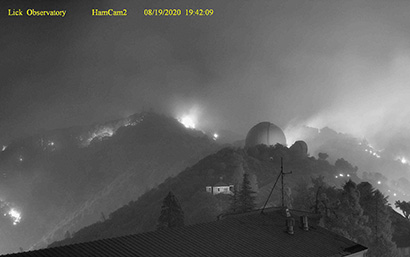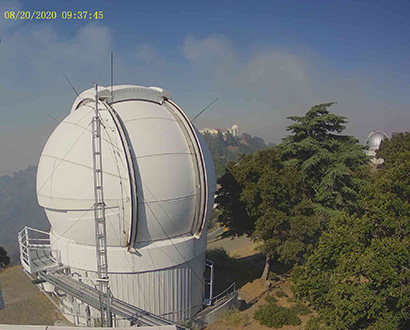Campus News
UC’s Lick Observatory threatened by fire
Residences on Mt. Hamilton sustained some damage, but fire crews have so far been able to protect the observatory’s telescope domes and visitor center.


As of 1 p.m. Thursday, the University of California’s Lick Observatory appeared to have escaped serious damage as the SCU Lightning Complex Fire swept across Mt. Hamilton east of San Jose on Wednesday. All observatory staff and Mt. Hamilton residents are safe.
UC Observatories Director Claire Max said firefighting units from Cal Fire and other organizations were stationed at Lick Observatory all night, using the observatory’s buildings as a command center and as a safety zone for the crews.
“Thanks to their tremendous efforts, the telescope domes did not burn,” Max said.
One residence that was not being used did burn completely, and several other residences sustained some structural damage, as well as smoke and water damage. A potential conflagration on the observatory’s Kepler Peak, where several residences are located, was averted through major efforts by fire crews overnight. Lick Observatory Superintendent Kostas Chloros described very high and hot flames surrounding Kepler Peak, but it appears all structures in the area were spared.
Max emphasized, however, that the danger to the observatory is not yet over. Some key areas were left unburned last night, and firefighters are concerned that the fire may circle back. Crews have been working hard to clear more space around the dome of the Shane 3-meter Telescope and several other nearby structures.
Mt. Hamilton is located within the Calaveras Zone of the SCU Lightning Complex Fire, which consists of about 20 separate fires burning in steep, rugged terrain throughout five counties.
Founded in 1888, Lick Observatory is at the forefront of astronomical research as an active research facility. Max said messages of concern about the fire have been coming in from observatories around the world.
Lick Observatory is operated by the University of California Observatories (UCO), a multi-campus research unit that serves eight UC campuses and is headquartered at UC Santa Cruz. More information is available online at www.ucolick.org. Information about the fire is also being posted on the Lick Observatory Facebook page.
Update, August 24, 2020: The fire that swept through the site of Lick Observatory last week has now moved on to the south. A strike team has been stationed at Lick to deal with potential day-time flare-ups from remaining hot spots. Most of the major structures at the observatory were saved, including all of the telescopes and their domes, but some of the residences were damaged and there will be high costs associated with rebuilding damaged infrastructure. To help address these needs, gifts can be made to the UCO Director’s Discretionary Fund.
For more information, tune in to a special virtual event on Tuesday, August 25, from 4 to 4:45 p.m., at https://ucsc.zoom.us/j/98932317498. UCO Director Claire Max will answer questions about the wildfires impacting Lick Observatory. Mt. Hamilton staff will join her to help provide updates on known damage and potential future repairs, as well as science timelines and priorities. They will try to answer questions in the chat, but will prioritize those questions sent in advance to social@ucolick.org.